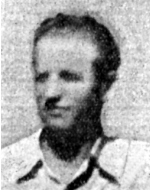Dov, the youngest son of Regina (nee Cohen) and Yaakov, was born on January 29, 1962, in Hungary, in the town of Nagisis. His family was poor, but his parents spared no effort to study in a Talmud Torah. Dov was endowed with good perception and quick absorption, continued his studies and progressed well. As a teenager, he learned the tailoring profession and made a living from his profession. On the eve of World War II, about 800,000 Jews lived in Hungary. In the late 1930s, under the influence of rapprochement with the Germans, anti-Semitic sentiments intensified, and since 1938 a series of anti-Jewish laws were enacted in Hungary, similar to the Nuremberg Laws. From the summer of 1939 the Jewish men were taken to the Munkaszolgalat (Labor Service) of the Hungarian army. In early 1944, the Hungarian ruler decided to end his alliance with Hitler, and shortly afterwards, on March 19, 1944, the Germans occupied Hungary. The situation of the Jews worsened greatly. In the following months, they were concentrated in ghettos and began to be sent to extermination camps. At the end of the war, some 250,000 Jews remained in Hungary. Dov and three of his brothers were among the recruits to labor camps. When the front was opened to the Russians in the summer of 1941, they were sent to the Ukrainian front and forced to dig ditches. Many of the recruits, including all of Dov’s brothers, did not survive. Dov’s parents and sister were sent to the death camp in Auschwitz, where they were exterminated. When Dov returned to Budapest after the war, he joined the Hungarian police, took part in the Hungarian Fascist cleansing operations and avenged the blood of his family. At the end of 1945 he felt that he could no longer remain on Hungarian soil and in his Lev decided to immigrate to Palestine. Passed through a bumpy road, often risked his life, and was saved from imprisonment, but succeeded. In 1946, he joined the soldiers of the Jewish Brigade who returned to Israel and arrived here wearing a soldier’s uniform, disguised as his true identity. Dov settled in Tel Aviv, studied Hebrew energetically and worked as a tailor. In the last days before his enlistment, he moved to Bnei Brak, where his friends lived. They remember him as a handsome-looking young man, tall and golden-haired, quiet and comfortable, gentle and dedicated to his work. When the events of the War of Independence broke out, he did not hesitate, and immediately stood up to defend the people and the homeland. At his farewell party before being sent to the front, he told his friends about his experiences on the Ukrainian front, with artillery shells whistling above his head. “If there,” he said, “nothing happened to me, I’ll live a long time.” Dov was attached to a religious department and sent to the Jezreel Valley region. His first training in the “Golani” Brigade – the No. 1 Brigade in the Haganah – was received in Sde Ya’akov. He later joined the ranks of the religious company of the 14th Battalion (“Dror”), and served as a departmental paramedic. As the battles intensified, Dov’s platoon was sent to the Lubia front. Lubya was a large Arab village (now the Lavi Forest near Golani Junction), which controlled an important crossroads in the Galilee on the way to Tiberias. The village consisted of Arab forces from the “Rescue Army” and other irregular forces, which constituted a threat to the communities of the Lower Galilee. Therefore, it was decided, as the date of the first truce in the war approached, to conquer the village. On July 9, 1948, the soldiers left for the attack on Lubia, and the attack failed, and many of the fighters fell in. Dov, accompanied by three comrades, returned wounded from the front line. He was brought to rest in a mass grave in the military cemetery in Afula, the last survivor of the Holocaust, the last of whom were survivors of the Holocaust who remained the last remnant of their nuclear family (parents, brothers, sisters, sons and daughters) On their own, the Holocaust in the ghettos and / or concentration and extermination camps and / or in flight and hiding in territories occupied by the Nazis and / or fighting alongside members of the undergrounds orPartisans in the Nazi-occupied territories who immigrated to Israel during or after World War II wore uniforms and fell in the Israeli army.
